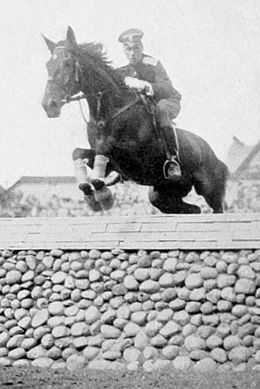Alexander Rodzyanko
| Alexander Rodzyanko | |
|---|---|
|
Alexander Rodzyanko at the 1912 Olympics | |
| Born | 18 August 1879 |
| Died |
6 May 1970 (aged 90) New York City, United States |
| Allegiance |
|
| Service/branch |
Imperial Russian Army White Movement |
| Years of service | 1897–1920 |
| Rank | Lieutenant General |
| Battles/wars |
World War I Russian Civil War Estonian War of Independence |
| Awards |
Order of Saint Vladimir Order of Saint Anna Order of Saint Stanislaus |
Alexander Pavlovich Rodzyanko (Russian: Александр Павлович Родзянко; 18 August 1879 – 6 May 1970) was a lieutenant-general and a corps commander of the White Army during the Russian Civil War.
Biography
Alexander Rodzyanko came from an old Russian aristocratic family: his father Pavel Rodzyanko was a major landowner and his uncle Mikhail Rodzianko chaired the State Duma from 1911 to 1917. Aleksandr received his education in the Russian Page Corps military academy and at the Cadre Noir cavalry-school in Saumur in France; he then joined the elite Russian Chevalier Guard regiment. An excellent equestrian sportsman, he also studied for a year at the cavalry school at Pinerolo in Italy under Captain Federico Caprilli, known as "the father of the modern forward seat". After successfully participating in London (1911), winning the King Eduard VII Cup, he competed in the 5th-placed jumping team for Russia at the 1912 Olympic Games in Stockholm.[1] Promoted Colonel in 1912, he went on to take part in World War I.Most of the equestrian information about Rodzyanko was published by a Dutch horse magazine, called the'Hoefslag' by the secretary of the FEI Max E. Amman
After the Russian Revolution of 1917 he accompanied Prince Lieven to solicit (unsuccessfully) British help for counter-revolutionaries active in Latvia.
In 1919 General Nikolay Yudenich appointed Rodzyanko (then commander of the Whites' Northern Army) as his aide. On 23 November 1919 Yudenich sent him to England to seek financial support. After his mission proved abortive, he chose not to return to Estonia but settled in Great Britain and later in the USA. His brother Paul Rodzyanko became an instructor at the Irish cavalry school in Dublin[2] and later emigrated to America. Aleksandr Pavlovich Rodzyanko became president of the Chevalier Guards association, wrote memoirs and died in New York City aged 92.[1] He is buried at the Novo-Diveevo cemetery in Nanuet, Rockland County, New York.
Honours and awards
- Order of St. Vladimir, 4th class with Swords (1913)
- Order of St. Anna, 3rd class (1913)
- Order of Saint Stanislaus, 3rd class (1913)
- Order of St. Anna, 4th class (1915)
More than 7 medals
References
- ↑ 1.0 1.1 Aleksandr Rodzyanko. sports-reference.com
- ↑ Трианон: Кавалергард [Trianon Horse Guards] (in Russian). 8 November 2013. Retrieved 9 February 2014.
А в конце 20-х годов Родзянко пригласили возглавить кавалерийскую школу армии молодого «Свободного Ирландского Государства», и он на несколько лет уехал в Дублин. Он до сих пор считается создателем ирландской кавалерии и его имя встречается во всех публикациях на эту тему.
Further reading
- grwar.ru (Russian)
- hrono.ru (Russian)
- Amman, Max E., De ruiters van de Tsaar, from the Dutch Horse Magazine -De Hoefslag-, 18 December 1969.
- Glahn, Erich, Reitkunst am Scheideweg. Die XVIe Olympischen Reiterspiele in Stockholm 1956, Heideheim, Hoffmann publishers, 1956
- Vieux Sang, Een ruiterlijk ruiterleven, from the Dutch Horse Magazine -De Hoefslag-, 20 juni 1968
- Littauer, Vladimir S. Russian Hussar. London: J.A. Allen & Co. Ltd., 1965.
- Littauer, Vladimir S. Horseman's Progress: The Development of Modern Riding. Princeton: D. Van Nostrand Company, Inc., 1962. (p. 226)
- Steinkraus, William C. "Foreword." The Development of Modern Riding. New York: Macmillan Publishing Company, 1991. (p. xiv)
